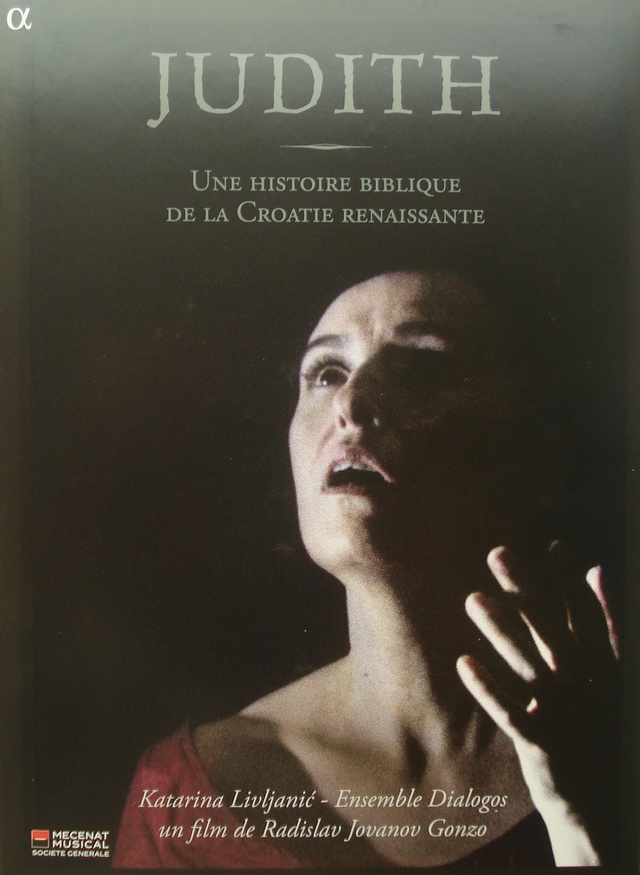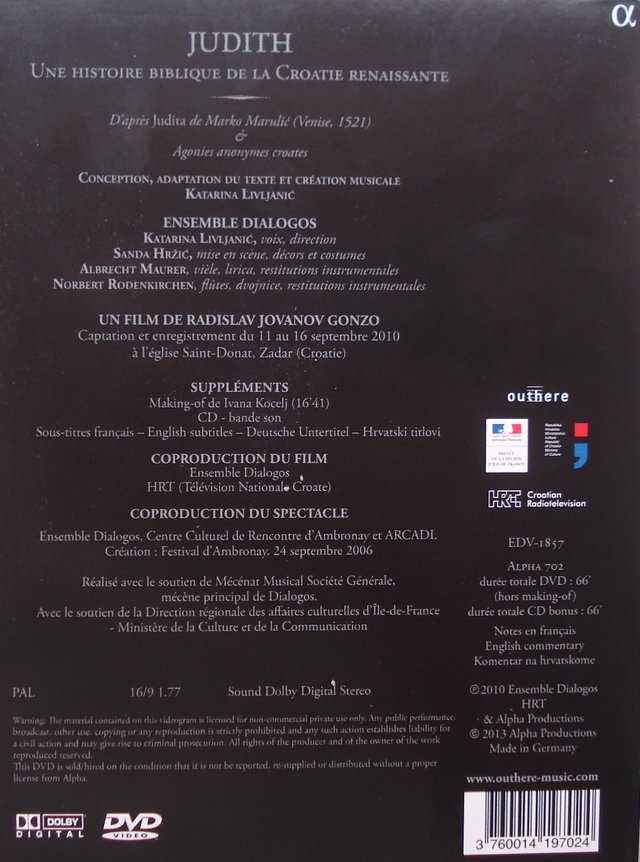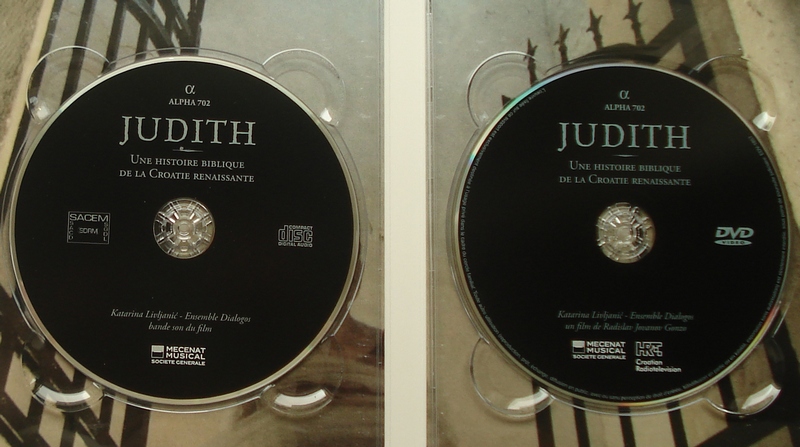Marko Marulic 1450-1524 and Katarina Livljanic: JUDITH biblical history of Renaissance Croatia
http://www.croatia.org/crown/articles/10430/1/-Marko-Marulic-1450-1524-and-Katarina-Livljanic-JUDITH-biblical-history-of-Renaissance-Croatia.html
By Darko Žubrinić
Published on 06/28/2013



 | Far from the traditional filming of a staged performance, Alpha and Katarina Livljanic offer a genuinely cinematographic work based on the epic poem Judita of the Croatian Renaissance writer Marko Marulić. Judita has been printed in Croatian language in 1521, and Marko Marulić, one of the greatest Croatian writers, expressly stated in the title of his book that the poem was written in Croatian language. Musically, this project by Katarina Livljanić, professor at the University of Paris - Sorbonne, is a reconstruction, using Gregorian, Beneventan and Glagolitic sources of medieval Dalmatia, as well as the study of Croatian Glagolitic chant in oral tradition. |
La beauté archaique du texte est ici fabuleusement illustrée par des images d'un raffinement esthétique incroyable

Katarina Livljanić, associate professor of Middle Age Music at the University of Paris - Sorbonne,
singer and interpretor, born in the city of Zadar in Croatia.
She is accompanied by Albrecht Maurer playing fiddle and lirica, and by Norbert Rodenkirchen playing flutes.
singer and interpretor, born in the city of Zadar in Croatia.
She is accompanied by Albrecht Maurer playing fiddle and lirica, and by Norbert Rodenkirchen playing flutes.
| Judith A biblical story from Renaissance Croatia Musical reconstruction: Katarina Livljanić The biblical story of Judith, a Bethulian widow who kills the enemy Holofernes to liberate her people, became a cornerstone of medieval Croatian literature, set in verses by Marko Marulić, Dalmatian poet of the 16th century. Written in Croatian, in the way of old traditional Glagolitic poets, this story is one of the few texts that Marulić wrote in his mother tongue, probably intended for a female audience which generally wasn’t familiar with the Latin language. Story Judith is a pious Hebrew woman, but she is also a beautiful and dangerous enchantress who infiltrates the palace of the Assyrian enemy, seduces the powerful general Holofernes and beheads him. The Agony of Judith tells this cruel story of Eros and Thanatos in an intimate and very intriguing way, using fragments of medieval disputationes from the Glagolitic tradition (also known as "agonies"), which alternate with the main story. These interpolated episodes allow us to leave the main action for a moment and hear what is happening inside the characters’ minds: just as Holofernes’ head separates from his body, his thoughts also "separate" into a very lucid dialogue between his body and his soul which happens in the moment of drunken sleep, before his death. A different inner dialogue - between Judith’s mind and her soul - occurs in the head of the heroine as she prays to God to help her kill the enemy who is in love with her. Background Musically, this project is a reconstruction, using Gregorian, Beneventan and Glagolitic sources of medieval Dalmatia, as well as the study of Glagolitic chant in oral tradition. The text of Judith survives without music but its metrical structure corresponds to a small number of archaic Glagolitic melodies used for storytelling in medieval Dalmatia, often in the context of the highly emotional and dramatic songs related to the Passion or rituals of the Holy Week. The text itself also refers to texts sung in the liturgical offices, so the task of reconstruction was to find, in related musical sources (Dalmatian and southern Italian), melodies corresponding to the suggestions of the original text. In this research, it was necessary to study the most archaic layers of what is called Glagolitic chant. This liturgical repertoire, sung in the local vernacular tongue (Croatian Church Slavonic) while actually belonging to the Roman rite, was preserved in manuscripts written in the Glagolitic alphabet, used in medieval Croatia. Written sources mention the existence of this chant in Dalmatia as early as the 11th century, within the circles of clergymen who didn’t speak Latin. Yet, the particularity of the Glagolitic repertoire, passed on orally, is its survival up to the present day in a few locations along the Croatian coast, on the Dalmatian islands and in Istria. *** In this musical monodrama, Judith & Holofernes, with all the personified demons inhabiting the inner world of their minds, are performed by a female voice playing several roles and using a wide spectrum of vocal nuances, a fiddle, a lirica (Croatian traditional stringed instrument tuned in a particular archaic manner) and archaic flutes. They build together a story which unfolds in growing emotional density, transposing this ancient tale, with its powerful and nostalgic Dalmatian melodies, into an intriguing theatrical context. Katarina Livljanić, voice, direction Albrecht Maurer, fiddle, lirica Norbert Rodenkirchen, flutes Staging, scenography and costumes: Sanda Herzic Lighting design and direction: Marie Bellot Philological advisor: Bratislav Lucin Instruments: Norbert Rodenkirchen - transverse flutes (Neidhart Bousset, Boaz Berney), traditional warpipe from Lombardy (anonymous), dvojnice (Stjepan Veckovic) Albrecht Maurer - fiddle (Thilo Viehrig), lirica (Zlatko Glavinic) Thanks to Gesine Moritz, fashion designer (Cologne) Technical note: This project can be performed with video subtitles if the space and technical conditions allow it. 1h 10min without intermission. Source www.ensemble-dialogos.org |

The booklet accompaning the CD and DVD is printed in French, English and Croatian, and has 63 pp.
It consists of several scholarly studies by Katarina Livljanić, Sandra Hržić, and Bratislav Lučin.
It consists of several scholarly studies by Katarina Livljanić, Sandra Hržić, and Bratislav Lučin.
| A propos de ce CD & DVD : Loin des captations traditionnelles, Alpha et Katarina Livljanic proposent un véritable travail cinématographie d'apres l'oeuvre croate, poétique et épique, de Marko Marulic. Musicalement parlant, ce projet se situe dans le champ d'une "reconstitution", inspirée par l'écoute et l'étude des sources grégoriennes et glagolitiques dalmates du temps de Marulic, ainsi que par des mélodies de traditions orales. Dans cette recherche, il a fallu étudier les couches les plus archaiques de ce qu'on appelle le chant glagolitique. Ce répertoire, chanté curieusement en langue vernaculaire locale, quoi qu'appartenant au rite romain, fut conservé dans des manuscrits en alphabet glagolitique, propre a la Croatie médiévale. La beauté archaique du texte est ici fabuleusement illustrée par des images d'un raffinement esthétique incroyable. |

Katarina Livljanić: Dotaknuti ljudsku dušu, Vijenac, br. 157., 9. ožujka 2000.
Formated for CROWN by Darko Žubrinić
Distributed by www.Croatia.org . This message is intended for Croatian Associations/Institutions and their Friends in Croatia and in the World. The opinions/articles expressed on this list do not reflect personal opinions of the moderator. If the reader of this message is not the intended recipient, please delete or destroy all copies of this communication and please, let us know!